Text
NOT YOUR ORNAMENT at Secession
15.9. – 12.11.2023
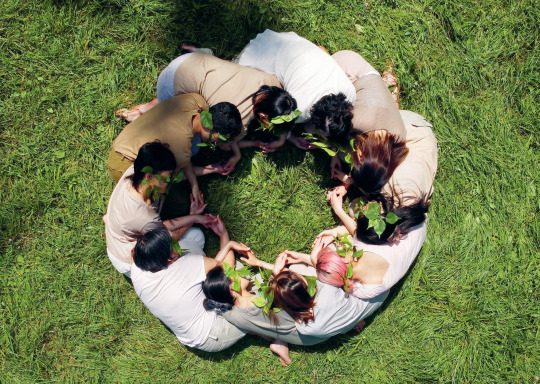
In NOT YOUR ORNAMENT Mai Ling investigates the racialized and gendered logic of “Ornamentalism”—a term conflating “Orientalism” and “ornamental” that the American feminist scholar Anne Anlin Cheng discusses in her book of that title, which analyses how the European and American imagination has constructed Asian femininity as a hybrid human being and decorative object. Mai Ling challenges such an objectified condition through ornamental and invasive plants. Drawing on the Secession’s close relation to the Art Nouveau movement—often characterized by ornamental designs inspired by natural forms, such as flowers and plants—Mai Ling aims to reclaim their agency confronted by the decorative aesthetics that perpetuates the sexualization and dehumanization of Asian bodies within white society.
In this exhibition, the kudzu plant plays a central role in relation to the concept of “stickiness” as an agency of resistance and pleasure. Initially introduced as an “ornamental” plant during the Centennial International Exhibition of 1876 in the U.S., and later used in agriculture to prevent soil erosion, the vine is now considered invasive in most of the Western world. Native to East and Southeast Asia and some Pacific islands, kudzu is known for its beneficial properties as a weaving material and as part of traditional medicine and cuisine, with the starch of its roots being used as a thickener and sticky ingredient.
In their two-channel video installation Becoming Stickiness Mai Ling positions themselves and their own journey as one with kudzu—embracing its transformative, sticky, pleasurable, and resilient qualities. As the collective puts it: “Transforming and becoming with kudzu means developing our own abilities to take up space, merge with our surroundings, meander through obstacles, heal our kin, and spread freely. They say kudzu is difficult to eradicate because of its large, tuberous root structures. Let our own roots grow strong together.” The work begins with the search for kudzu, stickiness and pleasure through the gestures of experimenting, cooking, eating, sensing, interacting with, and embodying the invasive plant.
It culminates in a collective choreography in which multiple bodies intermingle and ultimately become one with plants, challenging the troubled tensions within the politicised dichotomies between human and object, between decorative and invasive.
In an environment of ornamental plants in soil, the visitors can listen to the many voices of Mai Ling. Unfolding both historical accounts and their individual memories in relation to commodified house plants brought to the Western world, each story exposes the intricate entanglement of ongoing horticultural colonialism, exoticism, and migratory experiences. At the same time, the wallpaper re-appropriates botanical designs for domestic spaces typically seen in the Art Nouveau movement. The group portrait at the end of the exhibition further connects to Mai Ling’s existence being intertwined with that of the ornamental and invasive plants.
Mai Ling emerged as a group from the need for a platform to share experiences collectively. Hence, stickiness as a form of pleasure and fostering a stronger community was at the heart of their activities even before the notion was introduced to their practice.
In order to amplify the many voices involved, their reading room allows not only insights into previous works but access to relevant discourses on collectivity as well as diasporic and migratory communities. By offering guided tours "Together with Mai Lings" in multiple Asian languages during the exhibition, they create space for informal gatherings and exchange, inviting others to join them on a journey of Becoming Stickiness.
Curated by Christian Lübbert
Thank you for the support: Gartengestaltung Mag. Roman Fuchs
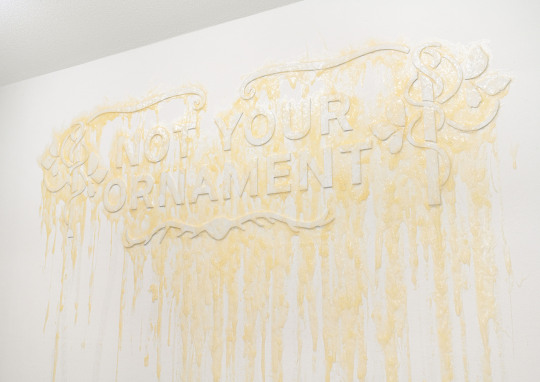
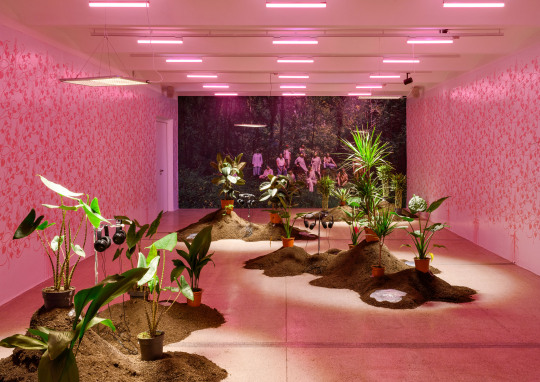
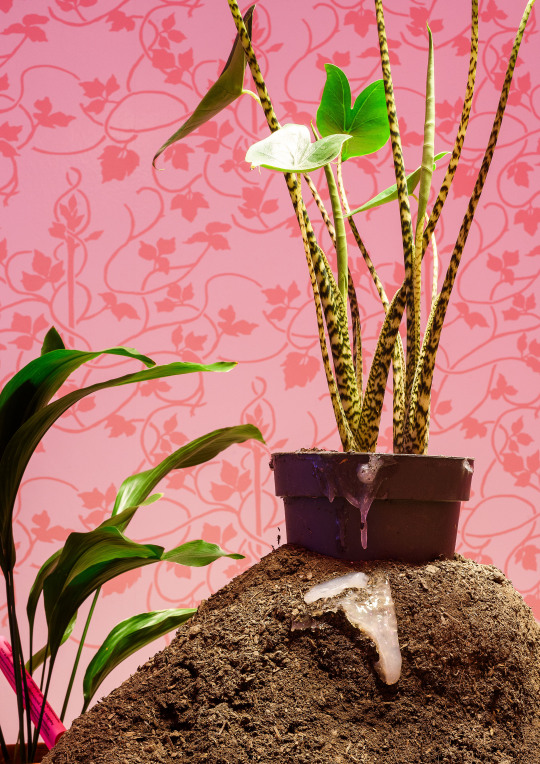
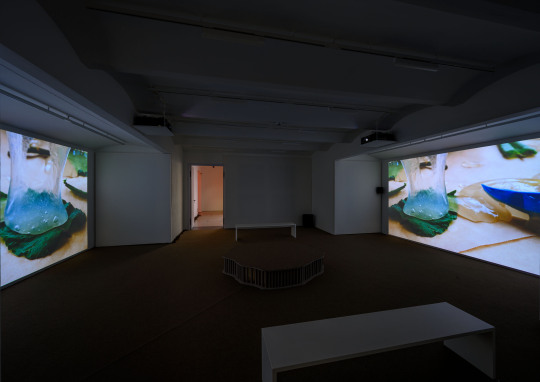
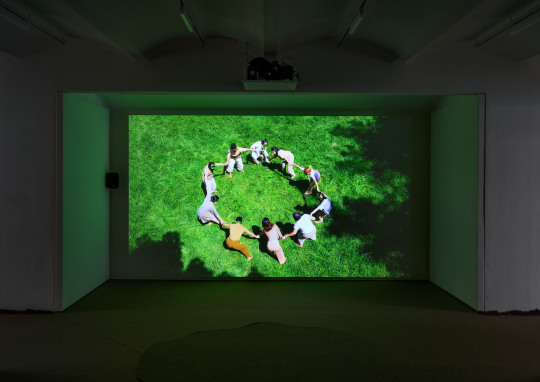
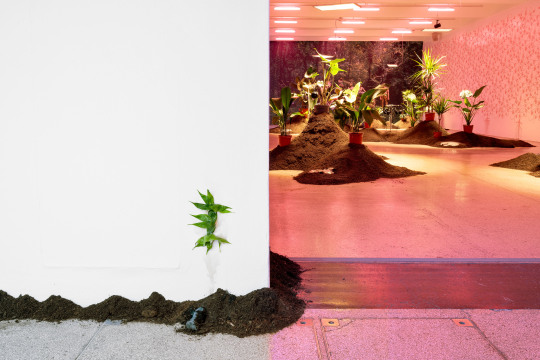
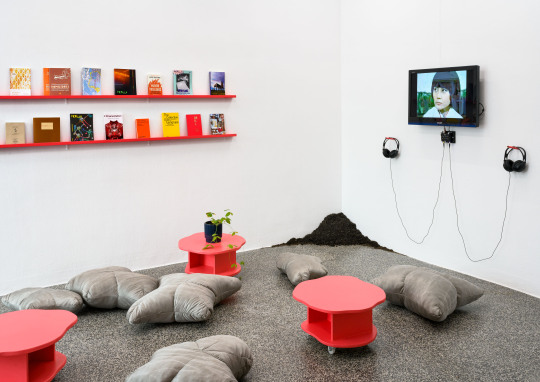
Mai Ling, NOT YOUR ORNAMENT, installation view, Secession 2023, photo: Iris Ranzinger
0 notes
Text
WIENWOCHE Closing Performance: Mai Ling Soup Bath
24 September 2023
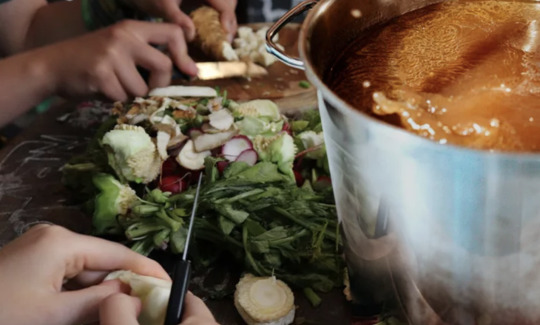
Mai Ling Soup Bath is an immersive journey of the senses and contemplation, wherein we shall commune through a harmony of flavours, a meditative sound bath, and caress. Food has always been a sacred place of kinship, solace, care, and tenderness. Let us gather as one, sharing in the embrace of a communal repast, igniting our spirits and nourishing our collective existence. Collectively, we will brew a pot of familiar sensations and edible memoirs — an embodiment of our intertwined pasts, present pulsations, and hopes. At the end of the session, everyone is invited to share a warm meal together.
Curated by Denise Palmieri for WIENWOCHE
With the participation of the pan-asian documentation archive WANDAPANDA & TIGER by Perilla
0 notes
Text
An Open Letter to Sina Niemeyer and FREELENS Galerie on her work ”The Many Wives of Mr. _____”
30 June 2023
[English]
It came to our attention, through Studiyo Filipino’s Open Letter, that an alarming article in the Neuen Zürcher Zeitung (NZZ) titled “Ich will ein Date zum Frühstück, Mittag- und Abendessen (I want a date for breakfast lunch and dinner)” appeared online on 9 June 2023. It was written by Dario Vereb on Sina Niemeyer’s project “The Many Wives of Mr. L“ currently on view at the FREELENS Galerie in Hamburg. The Open Letter that the Filipino community in Switzerland addressed to the artist, the writer, and the NZZ editorial team articulates a deep discomfort and should be acknowledged and respected.
As an artist collective and association of Asian migrant and diaspora background, based in Vienna, Mai Ling feels compelled to write this letter as to why, not just the NZZ article, but Niemeyer’s entire project “The Many Wives of Mr. ______“ itself has brought anguish among our communities.
The intent of Niemeyer’s project may have been to bring “awareness” to neo-colonial structures of patriarchy as claimed in the exhibition text. But, the project is strongly problematic and disturbing because of the reproduction of the very same structure of violence within the project that it claims to call-out. What is especially centered in the NZZ article is the white male who engages in an exploitative system of “singles-tours”, wherein the women appear as mere props without agency to the stories of these “lonely” white men: posed on the bed, on top of them, looking longingly at them. It's the same brutal othering dynamics reinforced.
Within the artist’s capacity for world-making, what her work has done is to accentuate the violent structures these women in the photos inhabit without once calling out these structures or giving insight into the context within which these structures are able to flourish. Her and the exhibiting institution’s lack of due diligence in both research and a critical cultural understanding of power relations shows in the failure to portray a nuanced representation of these women and the context within which they are engaged, and they are flattened once more into objects of desire.
Furthermore, the NZZ article engages in Niemeyer’s investigative interest without a nod to the imbalance of power and privilege that she holds as a white European woman behind the lens. It is clear that there is nothing at personal risk, as she says in the article, the project is looked at as a thrilling and exciting adventure. We believe that there is an ethical way to enter into worlds that the artist has the privilege of “just visiting”; a privilege that she uses to comment on the subject matter as if she was a neutral body, not being asked to give away her position or stake in this endeavor, a constant problematic of white feminism that entitles themselves to speak for other women while erasing marginalized bodies and silencing these voices. Please do not subject a structurally marginalized community to badly constructed projections of white fantasy. What makes this not just another (neo)colonial ethnographic project propelled by a curiosity of the other? What do you, the artist, and the gallery, have to offer these women whom the artist has chosen as “subjects”? The artist created the framework within which these stories are told, and this is where we hold the artist and the involved institutions accountable. The only acceptable recourse is to not show this work as it is, and to address the points the community has critically raised.
Our collective has appropriated a fictional character from Gerald Poltz’s 1979 German sketch of a voiceless Asian woman “Mai Ling”, a mail-order bride, a mute doll, a sexual fantasy ordered from a brochure. We have continually fought against these racially exotified stereotypes that use Asian women as a balm for white Western male conceit, a colonial narrative that Niemeyer’s work ultimately serves.
These stereotypes of submissive, sexually-desired Asian women reproduce everyday violence and microaggression towards our community, especially in places where we are the minority. Communities of color, artists, academics, and activists have labored long and hard to foster voices, create counter-narratives, and reclaim agency that Niemeyer’s project have greatly undermined. We see this as a gesture that signals the continued exotification of the Asian body especially within contemporary visual culture.
We, as Mai Ling, are speaking out against it.
Mai Ling
*This letter has been written with collaborators and colleagues in German-speaking countries who have raised the same concerns.
[Deutsch]
Ein Offener Brief an Sina Niemeyer, zu ihrem Werk "The Many Wives of Mr. _____" und der FREELENS Galerie
30 Juni 2023
Durch den Leserbrief von Studiyo Filipino sind wir darauf aufmerksam gemacht worden, dass am 9. Juni 2023 ein Artikel in der Neuen Zürcher Zeitung (NZZ) mit dem Titel "«Ich will ein Date zum Frühstück, Mittag- und Abendessen»: Einsame Männer reisen für eine Singles-Tour in die Philippinen. Eine Fotografin hat sie begleitet" online erschienen ist. Der Autor Dario Veréb berichtet über Sina Niemeyers Projekt "The Many Wives of Mr. L", welches derzeit in der FREELENS Galerie in Hamburg zu sehen ist. Der Leserbrief, den die philippinische Gemeinschaft in der Schweiz an die Künstler*in, den Journalisten, und die NZZ-Redaktion gerichtet hat, artikuliert ein tiefes Unbehagen, welches anerkannt und respektiert werden sollte.
Als Künstler*innenkollektiv und als Vereinigung der asiatischen Diaspora Community in Wien, sieht sich Mai Ling veranlasst, mit diesem offenen Brief auf die Gründe hinzuweisen, warum nicht nur der NZZ-Artikel, sondern auch das gesamte Projekt "The Many Wives of Mr. ______" für ein starkes Unbehagen in unserer Gemeinschaft gesorgt hat.
Die Absicht von Niemeyers Projekt mag es gewesen sein, ein "Bewusstsein" für neokoloniale Strukturen des Patriarchats zu schaffen. Das Projekt ist jedoch höchst problematisch und beunruhigend, weil es stattdessen genau dieselbe koloniale Gewalt verewigt und reproduziert. In dem NZZ-Artikel steht vor allem der weiße Mann im Mittelpunkt, der sich auf ein ausbeuterisches System von "Single-Touren" einlässt, bei denen die Frauen als bloße Requisiten ohne Handlungsmacht in den Geschichten dieser "einsamen" weißen Männer erscheinen: auf dem Bett posierend, auf ihnen liegend, sie sehnsüchtig anblickend. Es ist die gleiche brutale Dynamik des “Othering” (auch: Veränderung) , die dadurch verstärkt wird.
Im Rahmen der Fähigkeit eines:einer Künstlers:Künstlerin, Welten zu erschaffen, hat diese Arbeit (insbesondere im NZZ-Artikel) die gewalttätigen Strukturen, in denen die Frauen leben, hervorgehoben, ohne diese Strukturen je zu benennen oder zu kontextualisieren. Die mangelnde Sorgfalt der Künstlerin und der ausstellenden Institution in Bezug auf die Recherche und der Mangel an kritischem kulturellen Verständnis zeigt sich in der fehlenden nuancierten Darstellung dieser Frauen und des Kontextes, in dem sie sich bewegen. Die Frauen werden einmal mehr zu Objekten der Begierde (sowohl von Niemeyer als auch von den Männern) reduziert.
Darüber hinaus geht der NZZ-Artikel auf Niemeyers investigatives Interesse ein, ohne das Ungleichgewicht von Macht und Privilegien zu benennen, das sie als weiße Frau hinter der Linse hat. Es ist klar, dass kein persönliches Risiko eingegangen werden muss, wie sie in dem Artikel sagt. Das Projekt wird als ein spannendes und aufregendes Abenteuer betrachtet. Wir glauben, dass es einen anderen, ethischen Weg gibt, sich in Welten zu begeben, welche man aus einer privilegierten Position besuchen kann. Ein Privileg, das die Künstlerin nutzt, um das Thema so zu kommentieren, als wäre sie ein neutraler Körper, der nicht aufgefordert wurde, seine Position oder seinen Anteil an diesem Unterfangen preiszugeben. Ein ständiges Problem des weißen Feminismus, der sich anmaßt, für andere Frauen zu sprechen, während gleichzeitig marginalisierte asiatische Körper ausgelöscht werden und ihre Stimmen zum Schweigen bringen. Bitte setzt eine strukturell marginalisierte Gemeinschaft nicht den schlecht konstruierten Projektionen weißer Fantasie aus. Warum ist dies nicht nur ein weiteres (neo-)koloniales ethnografisches Projekt, welches von der Neugier auf das “Andere” angetrieben wird? Was haben Sie, die Künstlerin, und die Galerie, diesen Frauen, die die Künstlerin als Ihre "Subjekte" ausgewählt hat, zu bieten? Die Künstlerin hat den Rahmen geschaffen, in dem diese Geschichten erzählt werden, und genau dafür machen wir die Künstlerin und die beteiligten Institutionen verantwortlich. Die einzige akzeptable Lösung besteht darin, diese Arbeit nicht zu zeigen, so wie sie aktuell ist, sowie die von der Gemeinschaft kritisch angesprochenen Punkte zu adressieren und zu ändern.
Die Figur "Mai Ling" ist selbst eine sogenannte “mail order bride”. Unser Kollektiv hat sich diese fiktive Figur aus Gerald Polt’s deutschem Sketch von 1979 über eine asiatische Frau mit Namen "Mai Ling" angeeignet. Sie ist eine stumme Puppe, eine sexuelle Fantasie, die aus einer Broschüre bestellt wurde. Wir kämpfen kontinuierlich gegen diese rassistischen und exotisierenden Stereotypen an, welche asiatische Frauen als “Balsam” für die weiße, westliche und männliche Eitelkeit benutzen. Eine koloniale Erzählung, aus der sich auch Niemeyers Arbeit letztlich auch bedient.
Die Stereotypen von unterwürfigen, sexuell begehrenswerten asiatischen Frauen reproduzieren und verstärken die alltägliche Gewalt und die Mikroaggressionen gegenüber unserer Gemeinschaft, insbesondere dort, wo wir die Minderheit darstellen. BIPoC-Gemeinschaften, -Künstler*innen, -Akademiker*innen und -Aktivist*innen haben lange und hart daran gearbeitet, ihre Stimmen zu erheben, Gegennarrative zu schaffen und ihre Handlungsfähigkeit zurückzufordern, die nun durch Niemeyers Projekt stark unterlaufen wurden. Wir sehen diese Ausstellung als ein Zeichen der anhaltenden Exotisierung von asiatischen Körpern, insbesondere in der zeitgenössischen visuellen Kunst.
Wir, als Mai Ling, sprechen uns dagegen aus.
Mai Ling
*Dieses Schreiben wurde in Zusammenarbeit mit Mitarbeiter*innen und Kolleg*innen in den deutschsprachigen Ländern verfasst, die die gleichen Bedenken geäußert haben.
OPEN LETTER (EN)
OPEN LETTER (DE)
0 notes
Text
#20 Mai Ling Soup Bath x Vivências
18 November 2022
Cooking performance and gathering
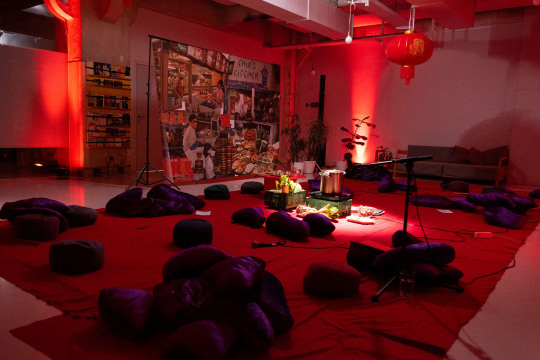
From your first taste of amniotic fluids to the everyday rituals of meal prep, food is deeply intertwined with memory, kinship, comfort and care.
Mai Ling Soup Bath invites you to a sensorial and contemplative food cleanse, sound bath, deep meditation and massage where we will collectively stir up a warm concoction of familiar senses and a meditative brew of edible memoirs while embodying our past, present and future.
At the end of the session, everyone is invited to share a warm meal together.
Presented in the project Vivências, initiated by kültüř gemma!, curated by Denise Palmieri and Marissa Lôbo at Kulturhaus Brotfabrik Wien.
Photo by: Marisel Bongola
0 notes
Text
Mai Ling Reads
Reading group
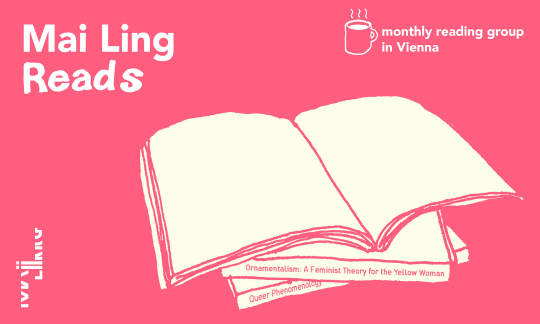
Mai Ling Reads is an informal monthly reading group, featuring intersectional feminist thinking in a casual cozy setting. Each time, we have a selected text to learn and unlearn the way of knowing and sharing.
Prior reading or knowledge is not required. Please bring the text with you in print or digitally, and we will read out the text together!
Mai Ling Reads 1: Ornamentalism
Date: Monday, December 12
Time: 19:00 - 20:30
Place: Offline in Vienna
This group is open to everyone who can respect each other. If you plan to join us for Mai Ling Reads 1, please let us know by sending an email to Mai Ling ([email protected]) by December 11. We will tell you the location.
Reading:
Anne Anlin Cheng, “Ornamentalism: A Feminist Theory for the Yellow Woman”, Critical Inquiry 2018 44:3, 415-446
https://www.journals.uchicago.edu/doi/epdf/10.1086/696921
Further readings:
Anne Anlin Cheng, “Yellow Skin, White Gold”, Asia Art Archive online, IDEAS Journal, 2020
https://aaa.org.hk/en/ideas-journal/ideas-journal/yellow-skin-white-gold
Anne Anlin Cheng, Ornamentalism, Oxford University Press, 2018
About the texts:
Tracing a direct link between the making of Asiatic femininity and a technological history of synthetic personhood in the West from the 19th to the 21st century, Ornamentalism demonstrates how the construction of modern personhood in the multiple realms of law, culture, and art has been surprisingly indebted to this very marginal figure and places Asian femininity at the center of an entire epistemology of race.
Anne Anlin Cheng is an interdisciplinary and comparative race scholar who focuses on the uneasy intersection between politics and aesthetics, drawing from literary theory, race and gender studies, film and architectural theory, legal studies, psychoanalysis, and critical food studies.
Mai Ling Reads 2: Ornamentalism
Date: Sunday, January 15
Time: 15:00 - 16:30
Place: Offline in Vienna
We continue reading the text by Anne Anlin Cheng, “Ornamentalism: A Feminist Theory for the Yellow Woman”, Critical Inquiry 2018 44:3, 415-446
https://www.journals.uchicago.edu/doi/epdf/10.1086/696921
Mai Ling Reads 3: Queer Phenomenology
Date: Sunday, February 5
Time: 15:00 - 16:30
Place: Offline in Vienna
This group is open to everyone who can respect each other. If you plan to join us for Mai Ling Reads 3, please let us know by sending an email to Mai Ling ([email protected]). We will send you the pdf of the text and tell you the location.
Reading:
Sara Ahmed, “Chapter 3: The Orient and Other Others”, Queer Phenomenology, Duke University Press, 2006. 109-156.
About the text:
Focusing on the “orientation” aspect of “sexual orientation” and the “orient” in “orientalism,” the author examines what it means for bodies to be situated in space and time. Bodies take shape as they move through the world directing themselves toward or away from objects and others.
Sara Ahmed is a feminist writer and independent scholar working at the intersection of feminist, queer and race studies. Her research is concerned with how bodies and worlds take shape; and how power is secured and challenged in everyday life worlds as well as institutional cultures.
-
Mai Ling Reads 4: Queer Phenomenology
Date: Monday, March 20
Time: 15:00 - 16:30
Place: Offline in Vienna
We continue reading the text “Queer Phenomenology.“
If you plan to join us for Mai Ling Reads 4, please let us know by sending an email to Mai Ling ([email protected]). We will send you the pdf of the text and tell you the location.
Reading:
Sara Ahmed, “Chapter 3: The Orient and Other Others”, Queer Phenomenology, Duke University Press, 2006. 109-156.
*In the last reading, we stopped at page 120, and we will continue reading from the section “Reducing Whiteness.”
-
Mai Ling Reads 5: Queer Phenomenology
Date: Wednesday, April 26
Time: 15:00 - 16:30
Place: Offline in Vienna
We continue reading the text “Queer Phenomenology“ from the section “Habit Spaces” (p.129).
If you plan to join us for Mai Ling Reads 5, please let us know by sending an email to Mai Ling ([email protected]). We will send you the pdf of the text and tell you the location.
-
Mai Ling Reads 6: Queer Phenomenology
Date: Thursday, May 18
Time: 15:00 - 16:30
Place: Offline in Vienna
We continue reading the text “Queer Phenomenology“ from the section “Mixed Orientations” (p.142).
If you plan to join us for Mai Ling Reads 6, please let us know by sending an email to Mai Ling ([email protected]). We will send you the pdf of the text and tell you the location.
-
0 notes
Text
#19 Mai Ling Kocht 3: We All Eat Dirt
Cooking Performance
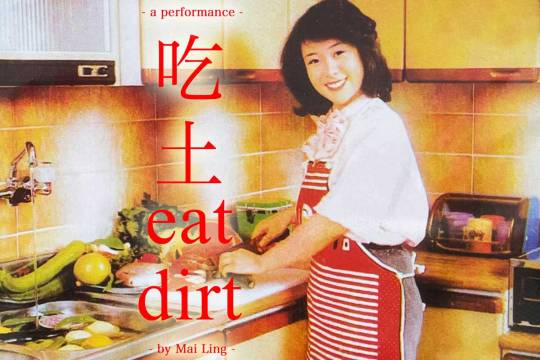
Mai Ling Kocht is a series of oral, auditory and haptic performances tapping into the evolution of Asian food through mobility. Taking place in both physical and virtual realms, Mai Ling experiments with conviviality inviting participants to descend into a deeper exploration of food — its stickiness, its histories and its politics. By tending to our desires for comfort and pleasure, food transforms beyond mere sustenance to a medium that satiates what was lost through migration. Through performative interactions with food, Mai Ling deconstructs oppressive structures and stereotypes — those that have been superimposed and reproduced — as a means for survival and protest.
Mai Ling Kocht 3: We All Eat Dirt
7-9 June, 2022, in the project Pickle Bar by Slavs and Tatars, Wiener Festwochen, Vienna
Mai Ling Kocht 3: We All Eat Dirt
6-8 May, 2022, donaufestival, Krems
Mai Ling Kocht 3: Eat Dirt
21 November, 2021, Volkskundemuseum Wien
0 notes
Text
#18 Ling’s Golden Imperial x MUME
1-2 September, 2021, Vienna
Pop-up Store
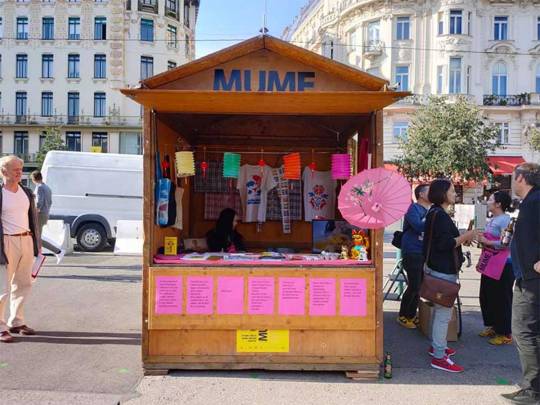
In a collaboration with MUME, an ongoing project of the nomadic museum by Oscar Cueto, Mai Ling opens two-day Golden Imperial Shop in Naschmarkt, Vienna.
Ling’s Golden Imperial Shop is a pop-up store — a food and supplies stopover and a space for conviviality and gathering. It traces a genealogy of elements constituting Mai Ling — as collective bodies and identities — questioning the display and its politics. The shop offers a concoction of objects, music and storytelling touching on intersectional issues of race, gender, sexuality and diaspora as well as politics of body (re)presentation, self-identification, self-stigmatization and the performativity of the “Asian” figure.
MUME: Ling’s Golden Imperial Shop is supported by KÖR (Art in Public Space Vienna) in cooperation with MA7 (Department of Culture of Vienna City), Mariahilf District Council and Embassy of Mexico in Vienna.
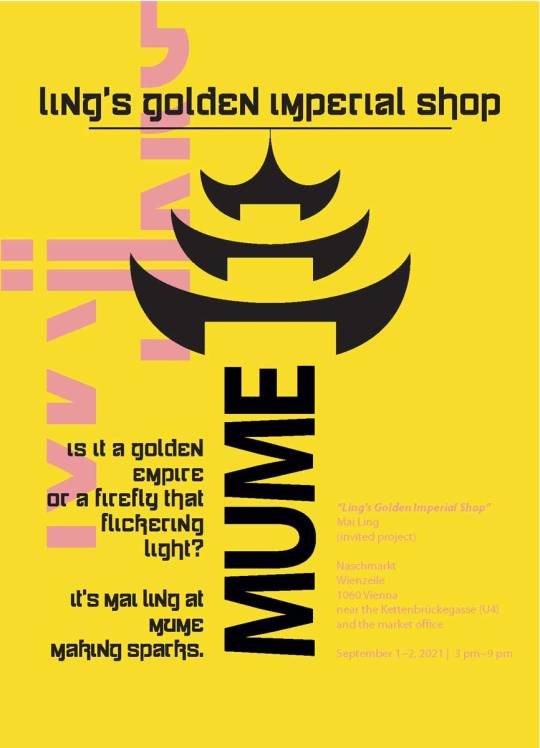
0 notes
Text
Mai Ling Kocht (edition: fish)
Online Performance
vimeo
Mai Ling Kocht (edition: fish)
HD Video (online), color, sound, 22:58 min, 2021, produced by FRUITFEST
Mai Ling Kocht is a series of oral, auditory and haptic meals tapping into the evolution of Asian food through mobility. Taking place in both physical and virtual realms, Mai Ling experiments with conviviality inviting participants to descend into a deeper exploration of food — its stickiness, its histories and its politics.
0 notes
Text
#17 Mai Ling Dialogues
Museum of Asian Arts in Nice (FR), 2021
Solo Exhibition
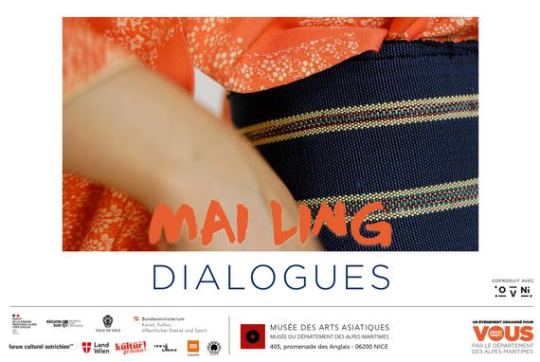
The objectification of “exotic” Asian female bodies, the perception and treatment of gendered and racialized bodies in Western society, and the historical-ethnographic background of the “European gaze” cast upon what is considered as “Far East culture” - these are the themes explored by Mai Ling, a Vienna-based association and artist collective.
The name “Mai Ling” refers to a fictional figure invented by Gerhard Polt, a famous German comedian, in 1979. In his video sketch, she embodies a submissive hybrid and fantasised stereotype of Asian women, who has been silenced and made invisible in the collective European imagination - she was bought in Bangkok, wears a kimono and cooks Chinese food. She does not speak for herself; instead, all information about her is given by Gerhard Polt, her Bavarian husband.
Even though this old satirical portraiture only offers a starting point, Polt’s normalization of the girl’s objecthood back in 1979 does not lose its relevance, as the same stereotypes and clichés are still pervasive today in contemporary culture. Artist collective Mai Ling re-narrates and re-portrays the once silenced “Mai Ling” with collective voices and multi-layered identities, in an effort to finally reclaim her speech.
Mai LingI Dialogues showcases the sheer diversity of the collective’s artistic and activist projects while generating dialogues with the museum’s space and rich collection, as well as incorporating voices from French context.
Exhibition Catalogue (pdf)
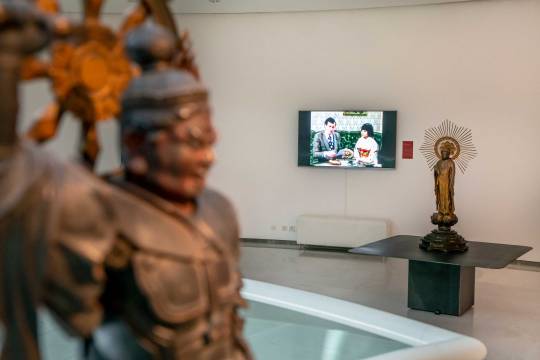
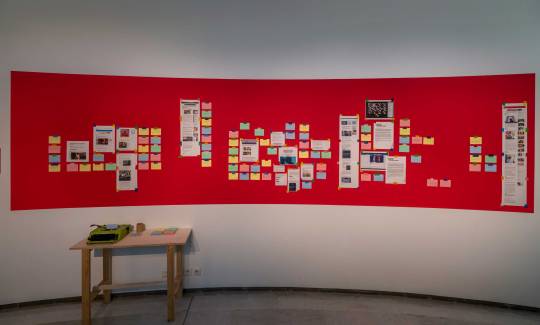

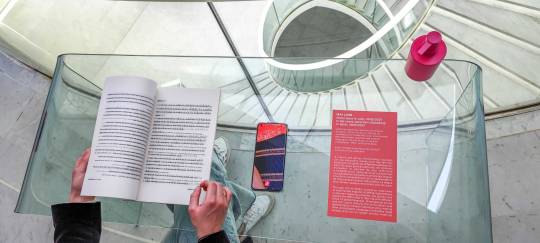
Installation views: © Olivier Anrigo
0 notes
Text
Mai Ling Kocht 2: Eating as pleasure and protest
Video Production
vimeo
Experimental Video, 12:27min, 2021
Supported by Kültür gemma!, MA7 ©Mai Ling
Mai Ling Kocht is a series of oral, auditory and haptic meals tapping into the evolution of Asian food through mobility. Taking place in both physical and virtual realms, Mai Ling experiments with conviviality inviting participants to descend into a deeper exploration of food — its stickiness, its histories and its politics.
By tending to our desires for comfort and pleasure, food transforms beyond mere sustenance to a medium that satiates what was lost through migration. Through performative interactions with food, Mai Ling deconstructs oppressive structures and stereotypes — those that have been superimposed and reproduced — as a means for survival and protest.
Context:
The evolution of Asian food through mobility has a long-standing history. Not only has it evolved in the occidental world to adapt to “western standards” of taste, aesthetics and aroma, dishes have also been redefined according to the availability of ingredients and local produce. Improvisation becomes key to habituate oneself to a new context where food standards differ.
Mai Ling wants to deconstruct recurring representations of the Asian female migrant body by questioning notions of exoticism, the kitchen and the sensorial, and aesthetic experiences of food. The performances of Mai Ling Kocht unfold the narratives behind migration and food, not only as multicultural additions to European palettes, but as representations of societal barriers and invisible forms of discrimination.
DE
Mai Ling Kocht ist eine Serie von mündlichen, auditiven und haptischen Mahlzeiten, die die Evolution des asiatischen Essens durch Mobilität erschließt. Mai Ling experimentiert mit Geselligkeit und lädt die Teilnehmer ein, in eine tiefere Erforschung des Essens einzutauchen - seiner Klebrigkeit, seiner Geschichte und seiner Politik.
Indem es unsere Sehnsüchte nach Komfort und Genuss befriedigt, verwandelt sich Essen über die bloße Nahrungsaufnahme hinaus in ein Medium, das eben jenes sättigt, was durch die Migration verloren gegangen ist. Durch performative Interaktionen mit Essen dekonstruiert Mai Ling unterdrückerische Strukturen und Stereotypen - solche, die überlagert und reproduziert wurden - als Mittel zum Überleben und Protest.
Kontext:
Die Evolution des asiatischen Essens durch Mobilität hat eine lange Geschichte. Es hat sich nicht nur in der westlichen Welt entwickelt, um sich an "westliche Standards" des Geschmacks, der Ästhetik und des Aromas anzupassen, die Gerichte wurden auch entsprechend der Verfügbarkeit von Zutaten und lokalen Produkten neu definiert. Improvisation wird zum Schlüssel, um sich an einen neuen Kontext zu gewöhnen, in dem andere Essensstandards gelten.
Mai Ling will wiederkehrende Repräsentationen des asiatischen Migrantinnenkörpers dekonstruieren, indem sie Vorstellungen von Exotik, der Küche und den sensorischen und ästhetischen Erfahrungen von Essen hinterfragt. Die Performances von Mai Ling Kocht entfalten die Narrative hinter Migration und Essen, nicht nur als multikulturelle Ergänzungen der europäischen Paletten, sondern als Repräsentationen gesellschaftlicher Barrieren und unsichtbarer Formen von Diskriminierung.
0 notes
Text
#16 Mai Ling Kocht at kültüř gemma! An Online Gathering Bringing Together Migrant + BIPoC Artists in Vienna
12-17 March, 2021
Virtual Performance and Artist Talk
Virtual Opening: 12 March, 2021, 18:00-20:00
Mai Ling Kocht: 13.03, 18:00-20:00 presentation followed by artist talk
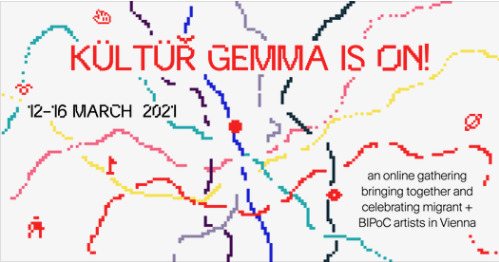
With much joy kültüř gemma! invites you to the final presentation for the grantees of 2020 entitled “An Online Gathering Bringing Together and Celebrating Migrant + BIPoC Artists in Vienna''. We are with a lot of enthusiastic joy to see the culmination of this journey in this final presentation.
Even in these times we are living in, which are filled with uncertainties, we want to celebrate this meeting of migrant artists and BIPoC folks living in Vienna. This year, due to the ongoing situation with Covid-19, the opening will take place online.
This is the culmination of more than six months of conversations, imagining scenarios for adapting the works to our digital platform, which will be the home of the presentations. Many laughs and challenges later, we are happy to say: Save the date: March 12 - March 16
Supported by kültüř gemma! and MA7.
0 notes
Text
#15 Mai Ling x VBKÖ
8-27 March, 2021
Solo Exhibition
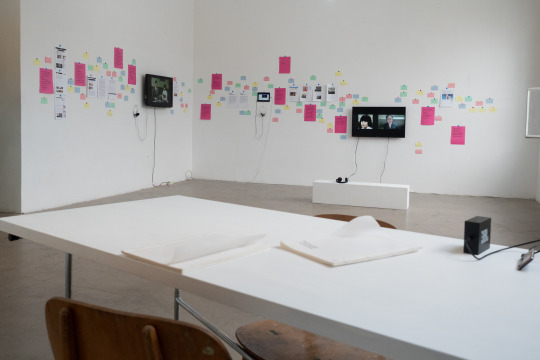
Open: every Thu, Fri and Sat, 14:00-19:00 or by appointment
Venue: Austrian Association of Women Artists (VBKÖ), Maysedergasse 2/28 (4. Stock), 1010 Wien
Virtual Opening Talk: With Stephanie Misa and Perilla Zine (Pete Prison IV & Weina Zhao), 8 March, 2021, 20:00
Mai Ling re-narrates and re-portrays the once silenced “Mai Ling” (originated from the TV sketch by Gerhard polt) with collective voices and multi-layered identities, in an effort to finally reclaim her speech, thorough re-appropriation and re-construction of the perception and treatment of gendered and racialized bodies in Western society. The exhibition Who is Mai Ling? showcases the sheer diversity of Mai Ling's projects.

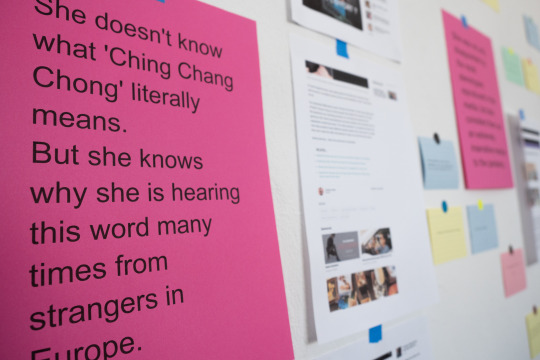
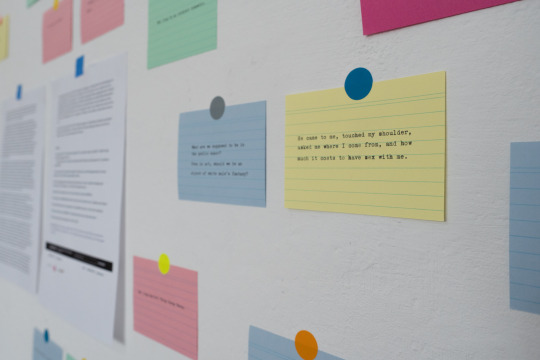
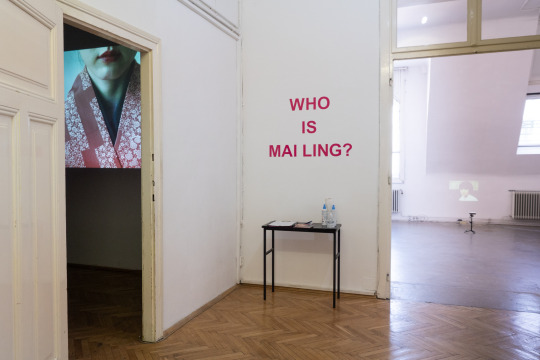
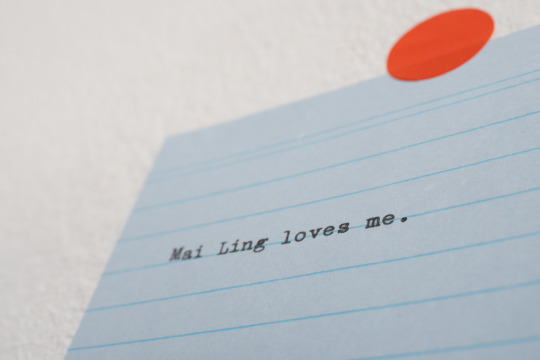
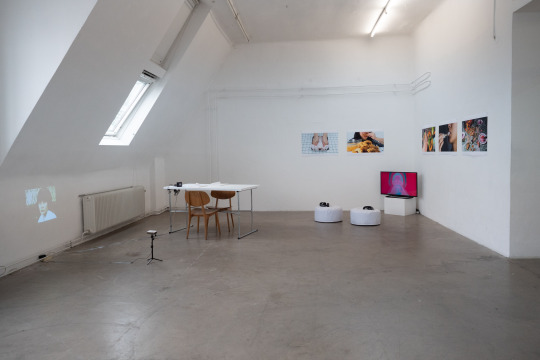
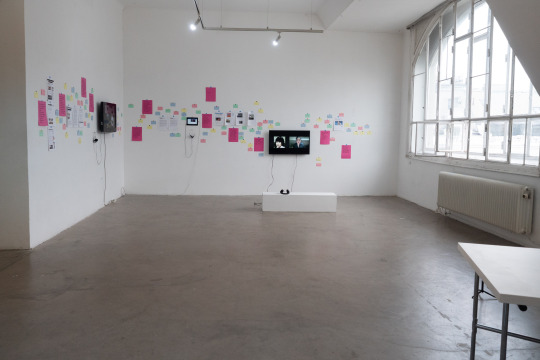
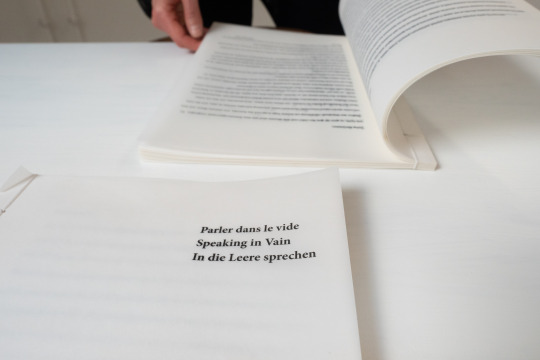
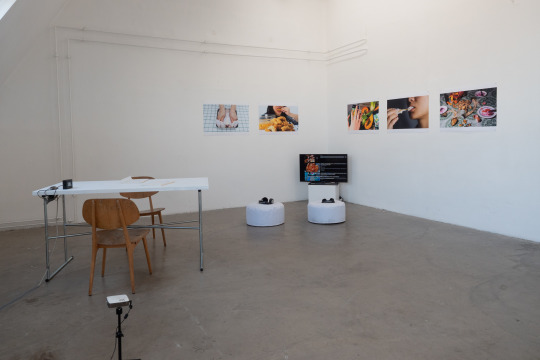
0 notes
Text
#14 MAI LING KOCHT 2 x CIVA Festival
February 26th 2021, CIVA Festival in Vienna
Virtual Performance
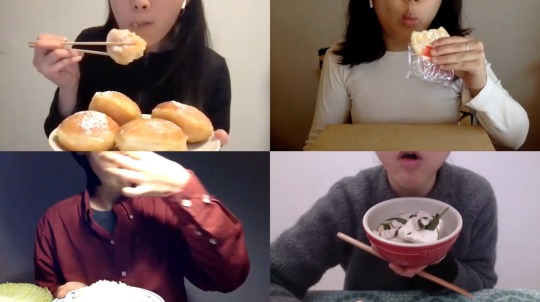
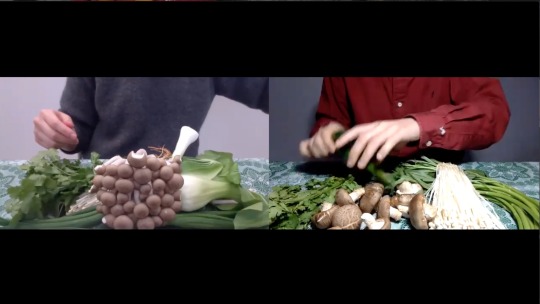
Mai Ling Kocht is a series of oral, auditory and haptic performances tapping into the evolution of Asian food through mobility. Taking place in both physical and virtual realms, Mai Ling experiments with conviviality inviting participants to descend into a deeper exploration of food — its stickiness, its histories and its politics.
By tending to our desires for comfort and pleasure, food transforms beyond mere sustenance to a medium that satiates what was lost through migration. Through performative interactions with food, Mai Ling deconstructs oppressive structures and stereotypes — those that have been superimposed and reproduced — as a means for survival and protest.
Conversing/Converging Intersectionally on Virtual Artforms programme created by Tonica Hunter as part of the 2021 CIVA festival (Contemporary Immersive Virtual Art)
Supported by Kültür gemma!, MA7 and CIVA Festival
0 notes
Text
#13 MAI LING x RADIO SLUMBER
12-14th February 2021
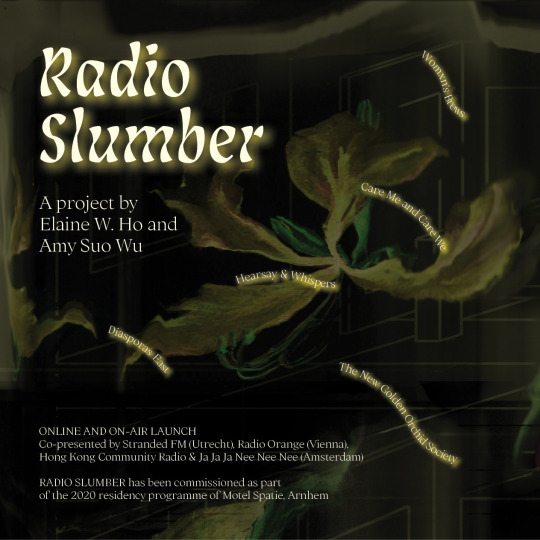
ONLINE AND ON-AIR LAUNCH 12-14 FEBRUARY 2021. THREE DAYS, FOUR STATIONS WORLDWIDE
Listen to RADIO SLUMBER séance No. 1 at Stranded FM (Utrecht) on Friday, 12 February, 18:00-19:30 CET
Listen to RADIO SLUMBER séance No. 2 at Radio Orange (Vienna) on Saturday, 13 February, 18:00-19:30 CET
Listen to RADIO SLUMBER séance No. 3 at Hong Kong Community Radio (HK) + Ja Ja Ja Nee Nee Nee (Amsterdam) on Sunday, 14 February, 18:00-19:30 CET
RADIO SLUMBER is a three-part aural brew and online grimoire that casts its gaze out from a closed-door coven of potluck workshops + secret societies + spa retreats + fests of slumber (ᴀᴋᴀ …pwsssrfs…) that took place at Motel Spatie in the winter of 2020. One year later, the mixed media herbs and processes complete a slow brew of deep listening, woven together with the formats of storytelling, conversation, music and other audio experimentation ripened by diasporic fermentation. Strategically dissecting cultural theorist Rey Chow’s ‘fascist longings in our midst’, RADIO SLUMBER’s audio book of spells whispers gossip about the accidents of intersectionalism, and explores—via the foundation of friendship—other practices of care from both near and far.
Including contributions from …pwsssrfs… participants Clara Balaguer (PH.NL.ES), Teana Boston-Mammah (SL.UK.NL), Chao Co-op (CN.HK), Seecum Cheung (CN.VN.UK.NL), Zoénie Liwen Deng (CN.NL), Angeliki Diakrousi (GR.NL), Clara Jo (DE.KS.UR), Vienna-based collective Mai Ling (AT.CN.AU.KR.JP.UK.DK.DE), Utrecht-based Read-in (CA.CO.DE.GR.ID.KR.NL), UK-based Rising Bun (UK.HK.NL), and more, with Elaine W. Ho (HK.US) and Amy Suo Wu (CN.AU.NL) serving as hosts, DJs and coven mama-sans.
Check link in BIO for streaming, latest information and project updates: radioslumber.net
0 notes
Text
#12 MAI LING x Fluctoplasma Festival
October 22nd - 25th 2020, Fluctoplasma Festival in Hamburg
Exhibition and Artist Talk
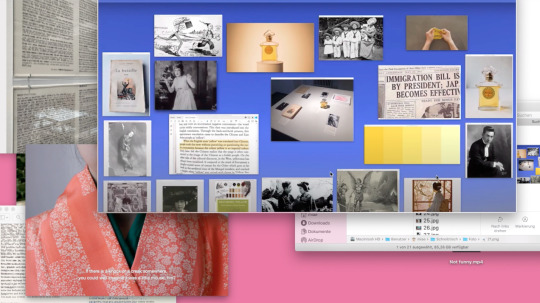
96 hours of Communication. Solidarity. Enrichment.
96 hours of Looking at the Status Quo. Of Future Outlook.
96 hours of Art. Discourse. Diversity.
fluctoplasma is an interdisciplinary art festival that will take place for the first time in Hamburg from 22 to 25 October 2020. We invite you to join more than 80 internationally rising artists and thinkers into moving towards a modern urban society - how would we like to live together in Hamburg in 5, 20 or 30 years?
Hell: The artistic works in 2020 are dedicated to experiences that simmer as open wounds in society - loss of loved ones, powerlessness, disorientation. They include things that hurt, that burn, that cause confusion and helplessness. We call this BLUE BURNING, because like a flame, the hottest spot is blue.
Join us in something completely new! Join us on this journey to create an alternative vision of society together with the participating artists* - a society that celebrates and lives diversity.
Let yourself get high for #96 hours.
0 notes
Text
#11 MAI LING KOCHT 1 x Kültür gemma!
September 11th, 2020 at the Migrating kitchen, Vienna
Cooking Performance

Comfort food is a safe and warm space of sensorial and cultural familiarity. Not judged by its “authenticity”, but rather, demanded out of scarcity. During the performance, Mai Ling will take you through a journey of being foreign and will show you how food is manipulated for ones own comfort.
This project is supported by kültür gemma! and MA7.
TRAILER
vimeo
Full Video
0 notes
Text
#10 MAI LING SPEAKS
From May 2020
A serial of talks at Echoraeume and more

a series of online performances, lectures and interviews connecting the active voices that are dealing with the anti-Asian ramifications of these exceptional times. How can we find community and solidarity at a time where anti-Asian xenophobia related to Covid-19 is escalating? What are the tools needed to contest this new normality and what everyday practices of solidarity can be performed?
Mai Ling Speaks is a subversive format aiming to diverge the discourse towards the individuals and communities affected while, at the same time, creating a discursive platform that bridges artistic practices with theory.
PREVIOUS EPISODES
Mai Ling Speaks #01 May 7th 2020 //
Interview with the New York based artist Kenneth Tam for an online interview to talk about his initiative WE ARE NOT COVID and the campaign StopDiscriminAsian.
youtube
Mai Ling Speaks #02 May 21st 2020
Interview with the German Based Association Korientation
youtube
Mai Ling Speaks #03 July 10th 2020
Part 1: Miwa Negoro 08:08, Part 2: Xiang Zairong 22:18
The silence of Asian people in history has played its part to fulfil the myth of being the “model minority” — a term used as a racial wedge to divide Asians and Blacks. The silence as a model minority was detrimental as it portrayed them as a homogenised group that was anti-affirmative action. In order to puncture the myth that Asians are white adjacent, complacent and silent, we need to build coalitions, inquire into our own internalised racisms and find ways to build bridges between minority groups instead of being instrumentalized to pit against each other.
During the ongoing Black Lives Matter movements, the slogan “Yellow peril supports black power” has been reactivated to purport the delusion that Asians struggles are likened to black struggles. This is simply not true. Yet, the global unrest we are experiencing today is urging us to open up the conversation and broaden our perspectives on anti-racism by bringing up histories and finding coalitions and allies.
youtube
regarding the statement of Xiang Zairong: Victoria Santa Cruz: “Me gritaron negra”
Mai Ling Speaks #04 August 14th 2020
Part 1: Nikita Yinqqian Choi, Part 2: Annie Jael Kwan (Asia-Art-Activism)
The current pandemic has underscored not only anti-Asian racism but also emphasised that economic and social stratifications still fall largely along the lines of race. Systemic and institutional racism has managed to disenfranchise people-of-colour successfully; the art world is not the exception of these conditions. Our silence, as people of colour with Asian backgrounds, in history has played its part to fulfil the myth of being the “model minority” — a term used as a racial wedge to divide Asians and other people of colour. In addition, the silence has resulted in wider invisibility of the struggles of Asian people that have been forgotten or ignored in the mainstream art history and institutional narratives. How can we challenge the present situations and open up our conversations in order to bring further understanding of transnational alliances with artistic and activistic practices?
youtube
Mai Ling Speaks #05 Online interview with Grace Ly
On the occasion of Mai Ling’s exhibition at the Museum of Asian Art in Nice, Mai Ling invited Grace Ly for the online interview.
Through her debut novel, web series, and podcasts co-animated with Rokhaya Diallo, French writer, director and podcaster Grace Ly focuses on the diversity of paths, communities and common identities of French Asians and how race affects everyday life in France, a “colorblind” country according to its official narratives.
youtube
Mai Ling Speaks #06 March 8th 2021, 20:00-
Online talk with Stephanie Misa and Perilla Zine (Pete Prison IV & Weina Zhao)
On the occasion of Mai Ling’s online opening of the exhibition “Who is Mai Ling?” at the Austrian Association of Women Artists (VBKÖ) as well as the International Women’s Day on 8th March, Mai Ling invites two guests from Vienna, Stephanie Misa and Perilla Zine (Pete Prison IV & Weina Zhao), as a part of the online series Mai Ling Speaks, connecting the active voices that are dealing with the anti-Asian ramifications of these exceptional times. The current pandemic has underscored not only anti-Asian racism but also emphasised systemic and institutional racism has managed to oppress people-of-colour successfully; the art world is not the exception to these conditions. With the guests, Mai Ling Speaks #6 connects and activate voices from Vienna while questioning multiracial whiteness, various forms of the diaspora, and experiences of discomfort.
Mai Ling Speaks #07
Interview Guanyu Xu on Disrupting Traditional Spaces and Identities on FAR NEAR
Mai Ling Speaks #08 July 3rd 2022, 17:30-
with WILTS Press and Yellow Peril at Belvedere 21, Vienna
On the occasion of Festival of Vocabularies Life Smashing Wor(l)ds: Cultural Practices for re/Imagining & un/Learning Vocabularies, Mai Ling invites two guests WILTS Press (Cristóbal Adam, Lara Bellon, and Dila Kaplan) and Yellow Peril, as a part of seventh episode of Mai Ling Speaks to focus not only on the surge of anti-Asian racism and xenophobia but also on languages and vocabularies of survival, life, culture, and subversion.
Mai Ling Speaks #9 July 12, 2023, 19:00-21:00
with Serena Lee, Aya Momose, and Hyeji Nam
Venue: Austrian Association of Wom*n Artists (VBKÖ)
How can we explore pleasure and resistance under precarious situations within artistic practices? By gathering and sharing together with the guests, “Mai Ling Speaks #9” connects and activates voices to foster communal ways of being, becoming, living, resisting, and surviving. For the new episode of “Mai Ling Speaks”, we invite three artists, Serena Lee, Aya Momose, and Hyeji Nam, who are exploring the somatic practice and its relationality to movement, sound, and technology, touching on power dynamics, recuperation, and trance-like state.
Serena Lee
Serena Lee works via polyphony to map how things come together and apart. She plays across cinematic and martial practices, tracing dao through aesthesis. Born and raised in tkaronto/Toronto, Canada, Serena collaborates and practices close to home and internationally; she is currently based in Vienna as a PhD-in-Practice candidate at the Akademie der bildenden Künste Wien. http://www.serenalee.com/
Aya Momose
By employing a self-referential methodology that reconsiders the structure of moving image via moving image itself, Momose’s work deals with the multi-layered complexity of communication with the others. Focusing on bodies appearing in moving images, her recent practice further questions sexuality and gender. Momose received an MFA in Oil Painting from Musashino Art University in 2013. She lives and works in Tokyo. http://ayamomose.com/
Hyeji Nam
Vienna-based Korean artist Hyeji Nam is a composer, musician and visual artist whose work spans around performance art, experimental music and digital media. She mainly works with multimedia projects which deal with subjects like body, mind and technology. https://hyejinam.org/
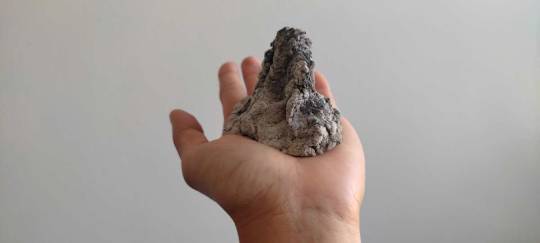
Process image, photo: Serena Lee

Aya Momose, Rehearsal scene of "Performing Acupuncture" (2021, 2023)

Hyeji Nam, “TOUCHED-techno flesh”, The Gym, 2022. Multimedia performance, soho studios, 60min. Photo by: MSTEAZAH
♦︎♦︎♦︎♦︎♦︎♦︎♦︎♦︎♦︎♦︎♦︎♦︎♦︎♦︎♦︎♦︎♦︎♦︎♦︎♦︎♦︎♦︎♦︎♦︎♦︎♦︎♦︎♦︎♦︎♦︎♦︎♦︎♦︎♦︎♦︎♦︎♦︎♦︎♦︎♦︎♦︎♦︎♦︎♦︎♦︎♦︎♦︎♦︎♦︎♦︎♦︎♦︎♦︎♦︎
About Echoraeume // Live Stream at http://echoraeume.klingt.org
Echoraeume is an open source initiative to empower ongoing cultural life during times of corona crisis. We aim to create an open-source, non-proprietary platform, where small and medium sized organizers can continue to host events, invite artists and therefore buffer the upcoming cultural dropout.
The project Mai Ling Speaks in 2020–2021 was supported by ÖH Uni Wien.

0 notes